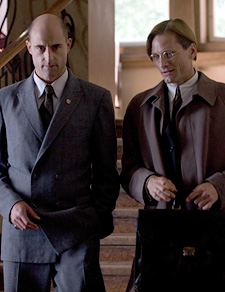Good measures the moral decline of an entire nation, through the willing mistakes made by a single man.
 Based on the critically acclaimed play by CP Taylor, Good tells the story of a literature professor, John Halder, whose ideas become useful to the Nazi party in 1930's Germany. Halder, played by Viggo Mortensen, has written a work of fiction in which the key character compassionately euthanises his sick wife. As an academic, he is critical of the book burnings and pograms that are currently sweeping the country. However his attitude changes when he is required to attend a meeting at a government office to discuss his novel. A leading Nazi informs him, "I am very impressed with the humanity of your writing," and his acceptance of the compliment leads to the opening of doors to all sorts of advantages.
Based on the critically acclaimed play by CP Taylor, Good tells the story of a literature professor, John Halder, whose ideas become useful to the Nazi party in 1930's Germany. Halder, played by Viggo Mortensen, has written a work of fiction in which the key character compassionately euthanises his sick wife. As an academic, he is critical of the book burnings and pograms that are currently sweeping the country. However his attitude changes when he is required to attend a meeting at a government office to discuss his novel. A leading Nazi informs him, "I am very impressed with the humanity of your writing," and his acceptance of the compliment leads to the opening of doors to all sorts of advantages.
The question that motivates the film is 'How does a good man go bad?' The answer it offers is 'by degrees.' Halder makes a series of seemingly minor decisions that have significant implications for his friends and family. His petty betrayal of his wife for a young mistress culminates in his abandonment of a long-time friend because he is Jewish. Halder is worried by his inability to fight the direction his life is taking simply because the results are so comfortable. His standard of living increases as he renders more support to the Nazis, and everyone responds with praise, yet the professor clearly suspects his own motives. Eventually Halder's intellectual support for euthanasia is finally used to enlist him in the creation of propaganda pieces and institutions that facilitate the disposal of society's undesirables.
The most interesting aspect of the film is the way that it deals with Haldor's conscience. Early on in the film the professor begins to suffer moments of hallucination in which people around him burst into sweet sounding music. These moments coincide with issues that should trouble his conscience, such as his dalliance with an admiring student. However they soon begin to focus around his personal betrayal of his ideals in general and his Jewish friend in particular. When the film finally concludes Halder finds himself at the gates of Auschwitz concentration camps, where the music he hears swells to the volume of an orchestra. But this time it is not an illusion; it is the film's reference to the very real SS practice of playing their prisoners in and out of the camp with classical music. In essence, the hints about where Haldor's personal betrayals would take him have been with him throughout his life.
The quiet, daily betrayals are just as capable of turning an ardent Christian into a confirmed, if uncomfortable pagan. CS Lewis believed that the 'softly, softly' approach is one of the key tactics of the Devil. To paraphrase Screwtape, he aims to introduce into every life that revolves around God a slight change in orbit that will ever-so-slowly send them spinning into outer darkness. As the director of Good, Vicentre Amorim notes, his is the story of a 'good' man,
". whose life takes a tragic turn - not from willful intent, or evil malfeasance, but by getting too absorbed in his unexpected good fortune to realise that is was actually bad fortune."
Good stands as a cautionary tale for everyone who would think that a little evil can be tolerated for the sake of a smoother path. And as such it reminds us of Paul's own warning on the subject:
"That kind of persuasion does not come from the one who calls you. A little yeast works through the whole batch of dough." (Galatians 5:8,9)


























